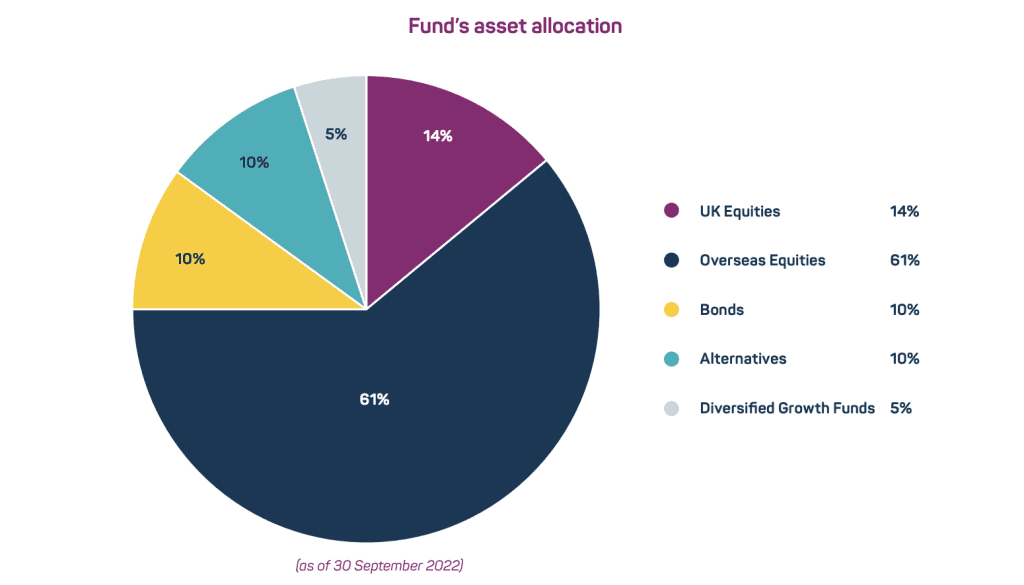
We spoke to James Lawrence, Head of Investment Proposition at Smart Pension Master Trust to compile the information in this case study.

Fund facts
£2.4bn
Assets under Management (AUM) (Sept 2022)
92.794
Employers represented
1,020,691
Number of members (Sept 2022)

Impact journey facts
- Ultimate aim of 16% in impact investments (13% as of now)
- 100% of the fun investor in ESG tilted funds (minimum compliance with article 8 of the Sustainable Finance Disclosure Regulations (SFDR))
- Aiming to map across to all ten Principles for Responsible Investment (PRI) Impact Investing Market Map themes
- Achieve net zero by 2040, with a 50% reduction by 2025
How did you get buy in for impact investment from trustees?
Across the organisation, we feel that impact investing represents the future of investment, particularly for Defined Contribution [DC] funds. Alongside providing strong long- term returns, we believe it is important to deliver a positive impact with the money we have been entrusted with. Impact investment fits these goals well. Fortunately, our trustees are aligned with us on this approach, as are our investment consultants who are very much at the forefront of our impact thinking.
Interestingly, at the outset, member interest was lower – although this is changing as members are increasingly concerned with the climate impact of their pensions.
Why did you choose to use the Impact Investing Principles for Pensions?
To support our impact investing approach, we have developed an impact investing framework with the Principles at its core. While we use other tools, such as the UN Sustainable Development Goals and the Principles for Responsible Investment (PRI) Impact Investing Market Map, to help us with implementation, we have found the Principles to be a very useful anchor point to underpin our wider approach.
What has your progress been on each of the Principles?
Principle 1: Set impactful objectives
We are currently in the process of finalising our impact investment beliefs, having first created draft ones guided by the Global Impact Investing Network. These centre around three core principles: financial stability (particularly around risk management and future-proofing returns), delivering a positive impact, and alignment with the UN Sustainable Development Goals.
At Smart Pension, we have a specific responsible investment policy as well as a specific climate policy. We intend to weave these beliefs into those policies, as well as building them into member communications like our investment guide, short videos and webinars.
Our impact objectives, which will be reviewed annually, are based on ten themes translated from the UN Sustainable Development Goals. Over time, we intend to expand our coverage to all ten.
Additionally, we use two frameworks: an impact investing framework and a net zero framework. Within our net zero framework, we have a proposed 5% allocation to climate solutions. Meanwhile, there is a 6% allocation to impact investments within the impact investment framework, and this is likely to be expanded to 20% over the next two or three years and up to 40% over the next five years.
Principle 2: Appoint investment consultants and managers with impact integrity
When we were first considering an impact investment approach, Hymans Robertson played a significant role in the development of our thinking. When we came to adopt the approach, naturally it made sense to reappoint them and add further impact objectives to their remit. We also recently conducted a search of the market, approaching and requesting information from 25 managers, to appoint those who were in line with our investment beliefs and objectives. Their support has been valuable, with our consultant working directly with the trustees to set our 6% allocation to impact investment. To ensure continued strong performance, we routinely assess our investment managers from an impact perspective and review our relationship with Hymans Robertson annually.
Principle 3: Use your voice to make change
We are currently in the process of reviewing our stewardship policy to ensure it is aligned with our impact objectives, adopting a “hands-on” ownership approach and using various tools to support this effort. To ensure we are up to date on any developments related to our impact objectives or stewardship guidelines, our advisers provide quarterly reports. They also participate in a monthly meeting designed to help our trustees identify relevant industry changes.
This focus on stewardship extends to our advisers and we assess their stewardship activities on a rolling quarterly basis, meaning each manager is assessed annually. This engagement is set to increase in the future, following the completion of our stewardship policy review. We are also open to and influenced by the views of our members, and we have received a good amount of feedback on where our members do and don’t want to invest, all of which helps shape both the default and self-selection range. We are also part of the Occupational Pensions Stewardship Council (OPSC) and were a signatory to their recent letter to asset managers on split voting. We will become a signatory to their stewardship code next year.
Principle 4: Manage and review your impact
To assess our progress, we are developing and working through a number of tools, including the PRI Impact Investing Market Map. We are also carrying out a draft run of reporting based on the recommendations of the Taskforce for Climate-Related Financial Disclosures and are working with Hymans Robertson on climate change scenario analysis.
This measurement process and an awareness of all of the positive and negative impacts across our portfolio, constantly influence our process of reviewing objectives. This approach develops over time and is influenced both by feedback and wider market developments. Through our work with Hymans Robertson and our exercise to recruit managers with aligned beliefs, we have a good snapshot of where the market is now. In the future, we will increase our focus on managing and reviewing our impact.
“Impact Investing is the future of investing, particularly given the long-time horizon, large inflows and sticky money. Above all, it is the right thing to do, given the challenges in the world.
The Impact Investing Principles are very useful and the core of Smart Pension’s impact investing framework” James Lawrence, Head of Investment Proposition.

